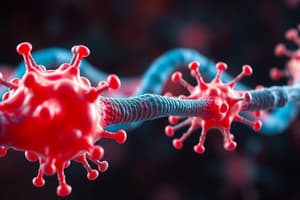Podcast
Questions and Answers
What is pharmacology?
What is pharmacology?
Study of drugs and their effects.
What does pharmacotherapeutics focus on?
What does pharmacotherapeutics focus on?
Using drugs to treat, prevent, and diagnose disease.
Define pharmacokinetics.
Define pharmacokinetics.
The study of how drugs move through the body.
What is biotransformation in the context of drugs?
What is biotransformation in the context of drugs?
Which of the following is a category of drug safety during pregnancy?
Which of the following is a category of drug safety during pregnancy?
The right ______ is essential in safe medication administration.
The right ______ is essential in safe medication administration.
Match the following rights of medication administration:
Match the following rights of medication administration:
What are high alert medications (HAMs)?
What are high alert medications (HAMs)?
What is the primary focus of adverse drug effects?
What is the primary focus of adverse drug effects?
Which of the following is NOT a part of hypersensitivity?
Which of the following is NOT a part of hypersensitivity?
What is the metric system used for?
What is the metric system used for?
Flashcards are hidden until you start studying
Study Notes
Pharmacology Overview
- Study of drugs, their effects and biological interactions.
- Involves preparation, usage, and impact of chemical substances in treating diseases.
Key Branches of Pharmacology
- Pharmacotherapeutics: Focuses on drug use for treatment, prevention, and diagnosis of diseases.
- Pharmacokinetics: Examines drug movement within the body.
- Pharmacodynamics: Studies the body's responses to drugs.
Drug Characteristics
- Drugs: Chemicals used for treatment, prevention, or diagnosis of diseases.
- Excretion routes include gastrointestinal (urine), skin, and respiratory tract.
Drug Forms and Administration Routes
- Oral: Taken through the digestive system.
- Inhalation: Directly into the respiratory system.
- Topical: Applied to the skin for local absorption.
- Parenteral: Injectable forms are 100% absorbed.
Biotransformation and Half-Life
- Biotransformation refers to the body’s process of metabolizing drugs.
- Half-life: Time taken for drug concentration to reduce by half; varies with dosage.
Drug Safety Categories in Pregnancy
- Category A: No risk identified.
- Category B: Minimal risk or lacking studies.
- Category C: Risks identified.
- Category D: Well-documented risks.
- Category X: Contraindicated due to known fetal harm.
Ideal Drug Characteristics
- Reversible: Effects can be undone.
- Predictable: Consistent responses expected.
- No adverse effects: Minimal to no unwanted effects.
- Cost-effective and simple: Affordable and easy to use.
Patient Safety Protocols
- Importance of ensuring patient identity and effective communication.
- Focus on preventing falls and managing high-alert and look-alike medications.
Goals in Pharmacology
- Leverage natural sources (plants, animals, inorganic materials) and synthetic sources for drug development.
- Strive for drug effectiveness with selectivity and safety.
Drug Evaluation Process
- Preclinical Trials: Initial testing on animals before human trials.
Medication Rights
- Ensure correct patient, dosage, route, medication, and timing of administration.
Adverse Effects
- Primary Effects: Directly related to drug action.
- Secondary Effects: Broader range of impacts beyond initial effects.
- Hypersensitivity: Excessive responses to drugs.
Related Laws
- Republic Act 2382: Physicians are authorized to prescribe medications.
- Republic Act 5921: Only registered pharmacists can dispense medications.
Measurement Systems
- Metric System: Legal standard for measurements.
- Apothecary System: Weight measurement system used in pharmacy.
- Household System: Common for everyday measurements.
- Avoirdupois System: Another system of weight measurement.
Nursing Process
- Organizes patient information for effective care.
- Supports Activities of Daily Living (ADL) and lifestyle adjustments.
Hypersensitivity Reactions
- Anaphylactic Reactions: Severe, systemic allergic responses.
- Cytotoxic Reactions: Reaction attacking cell sites.
- Serum Sickness: Immune response damaging various tissues.
- Delayed Reactions: Allergic responses developing over time.
Studying That Suits You
Use AI to generate personalized quizzes and flashcards to suit your learning preferences.




